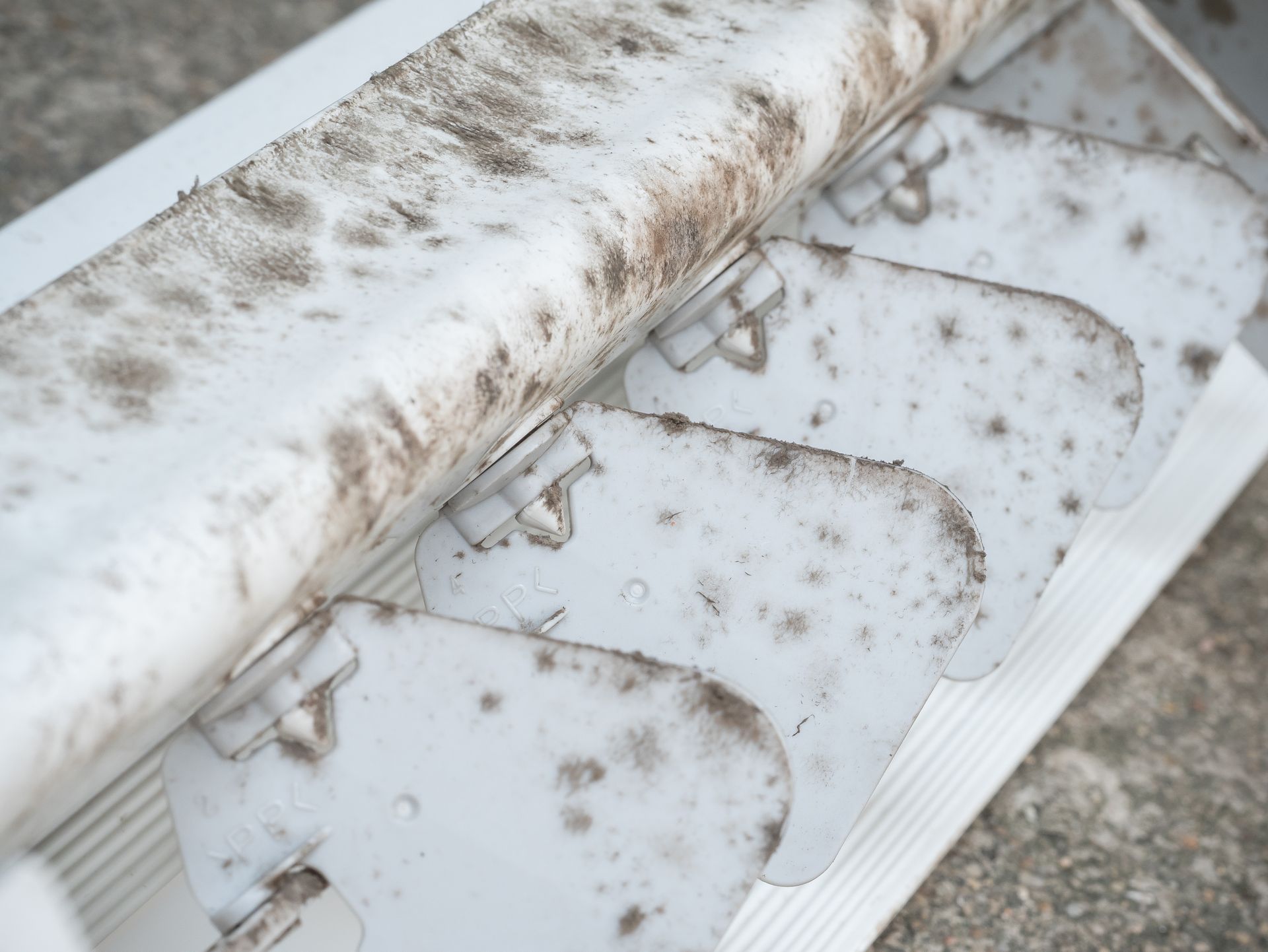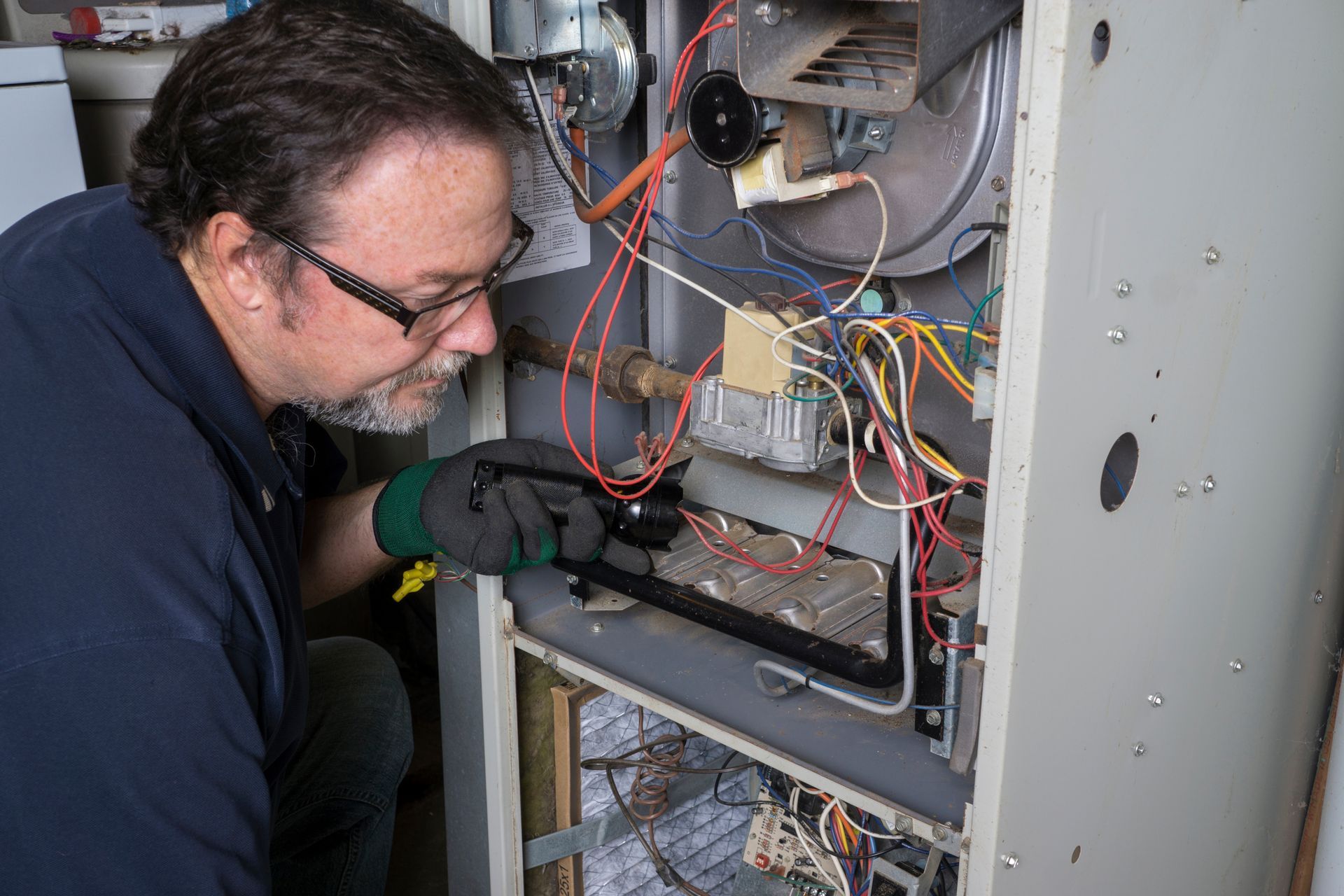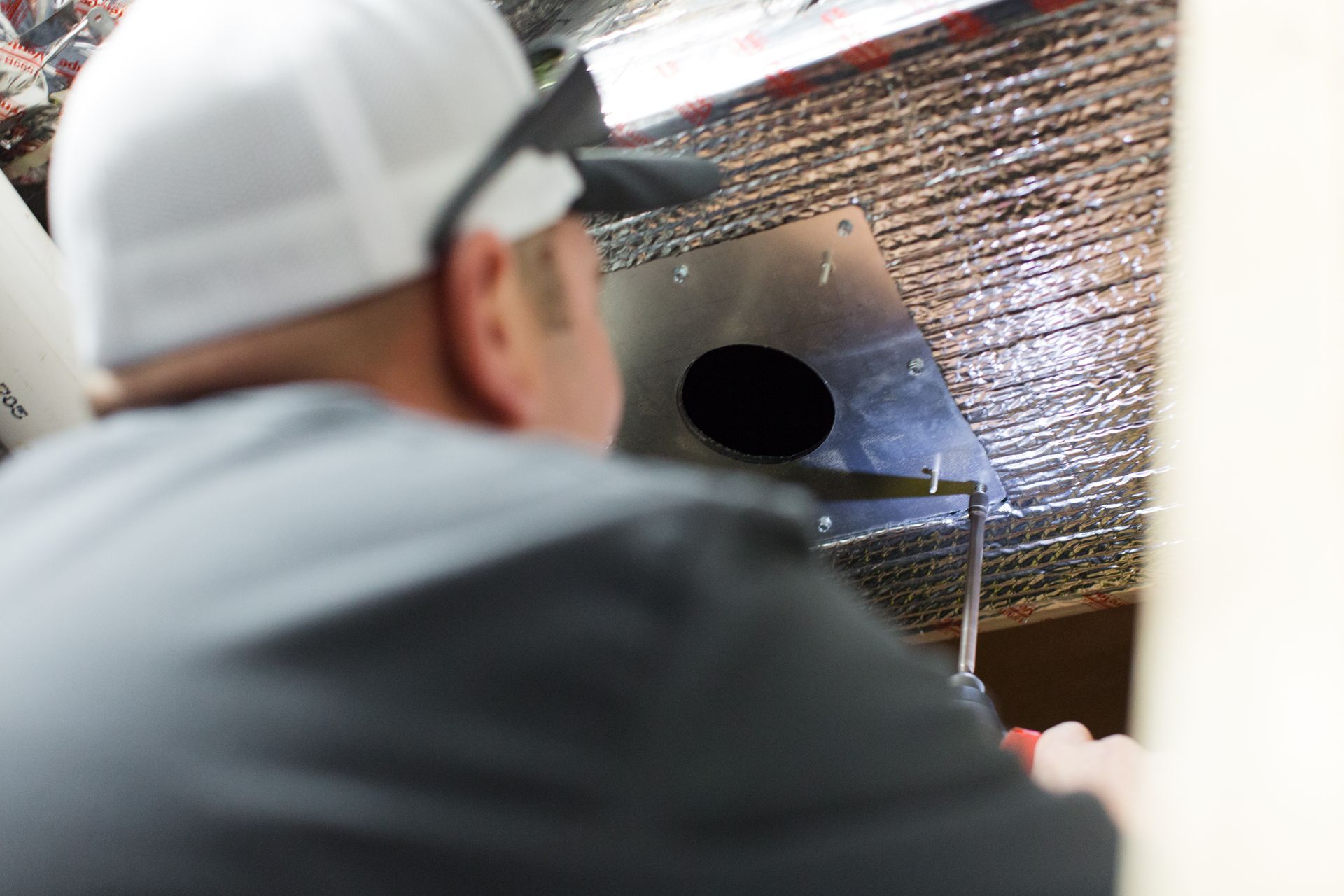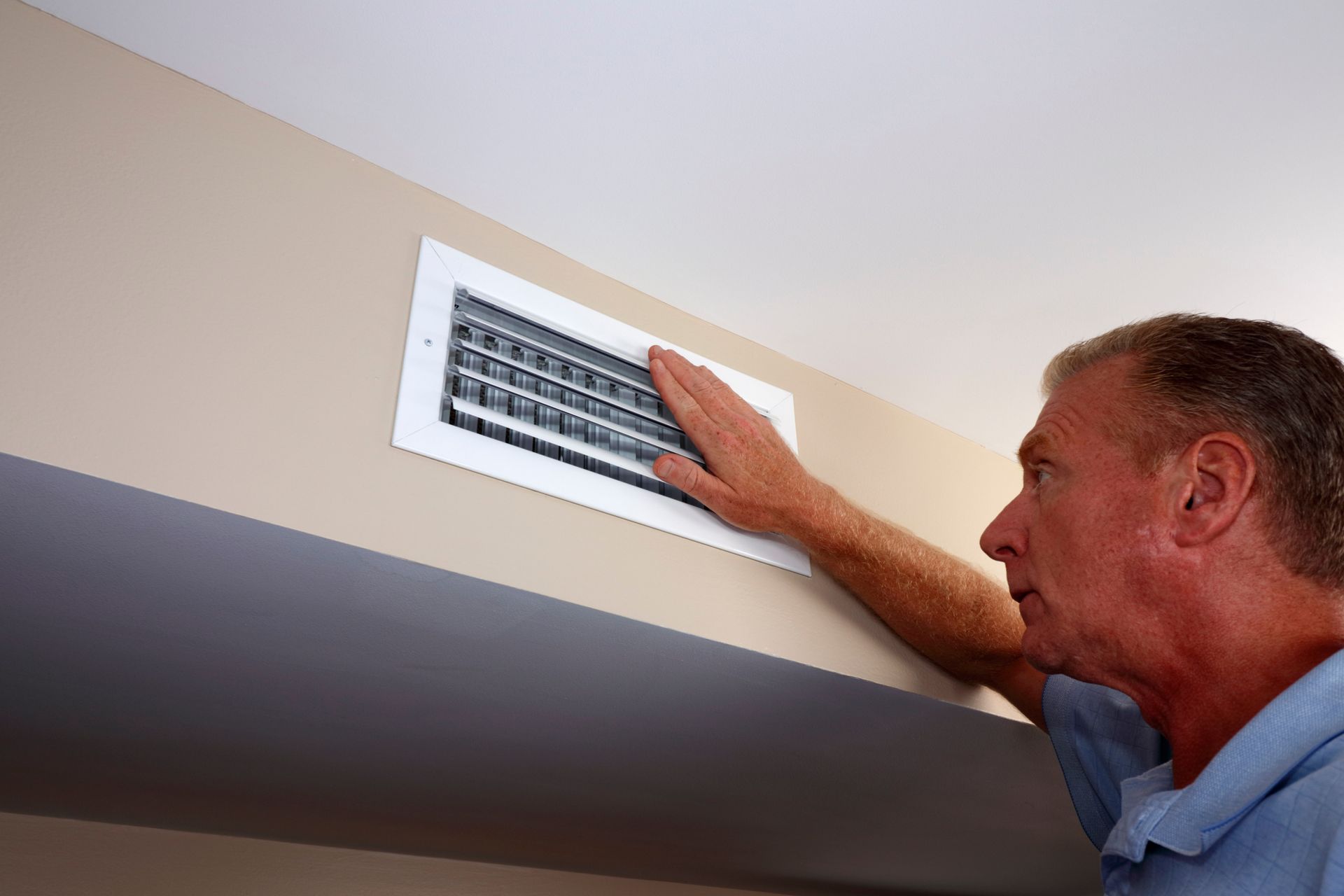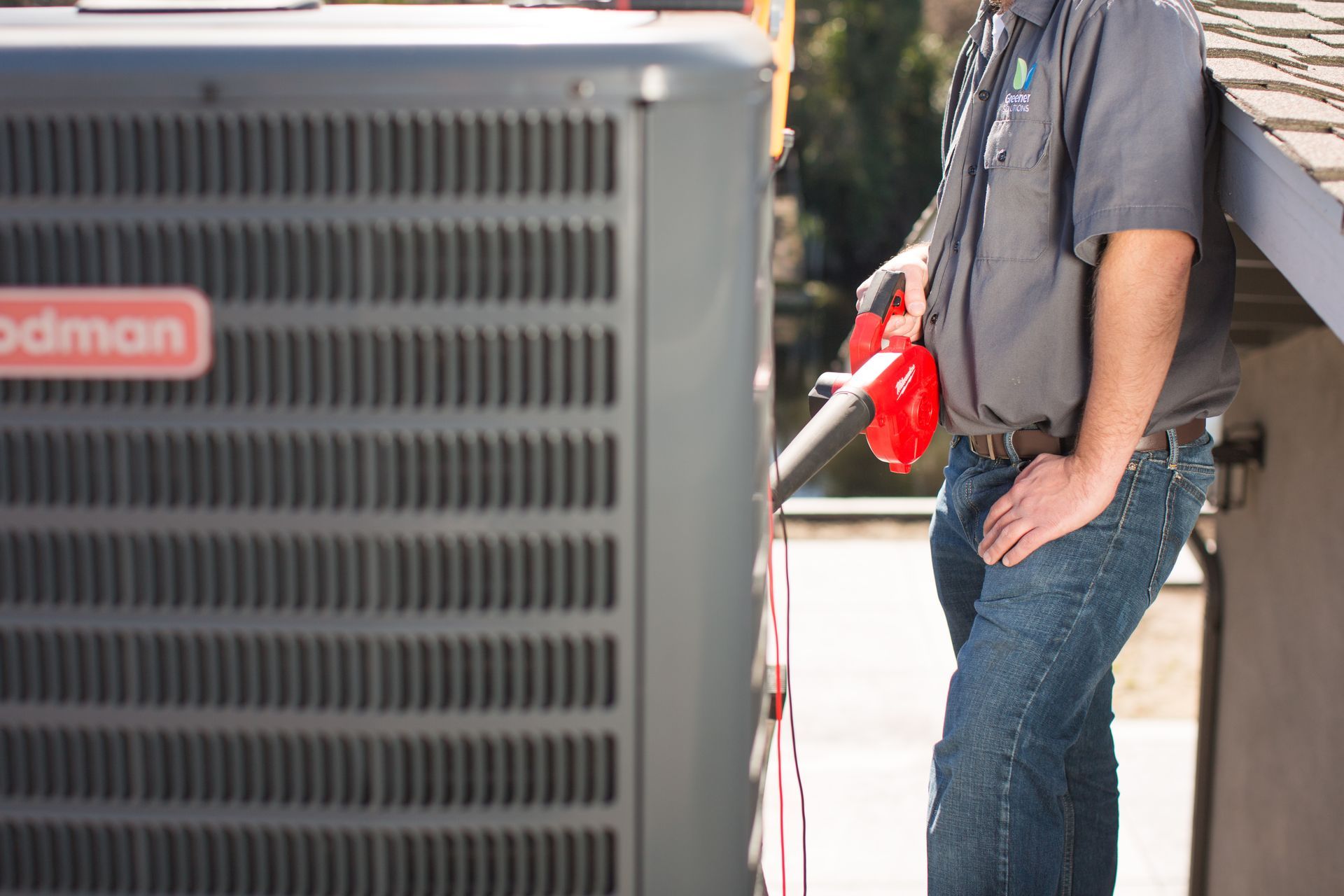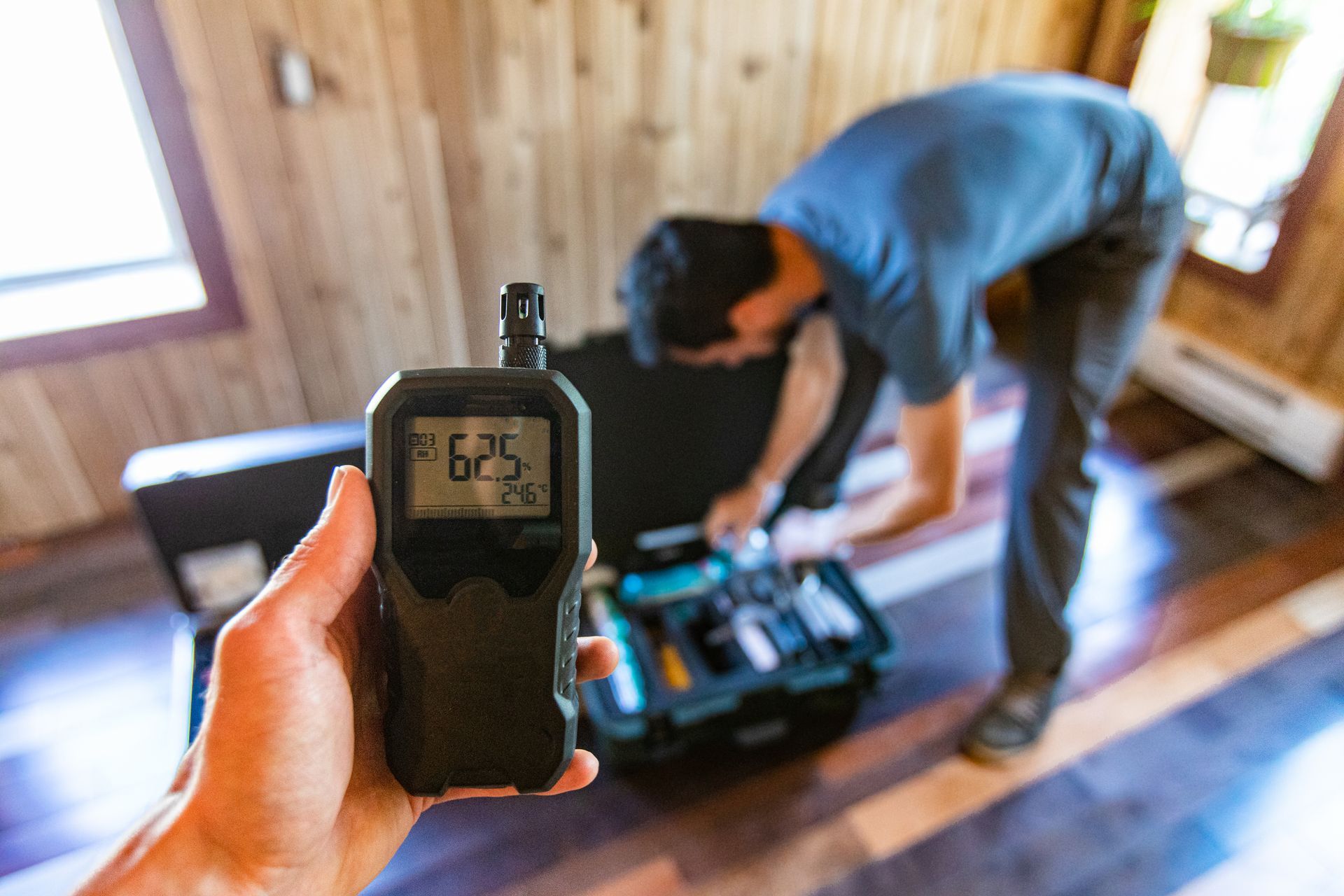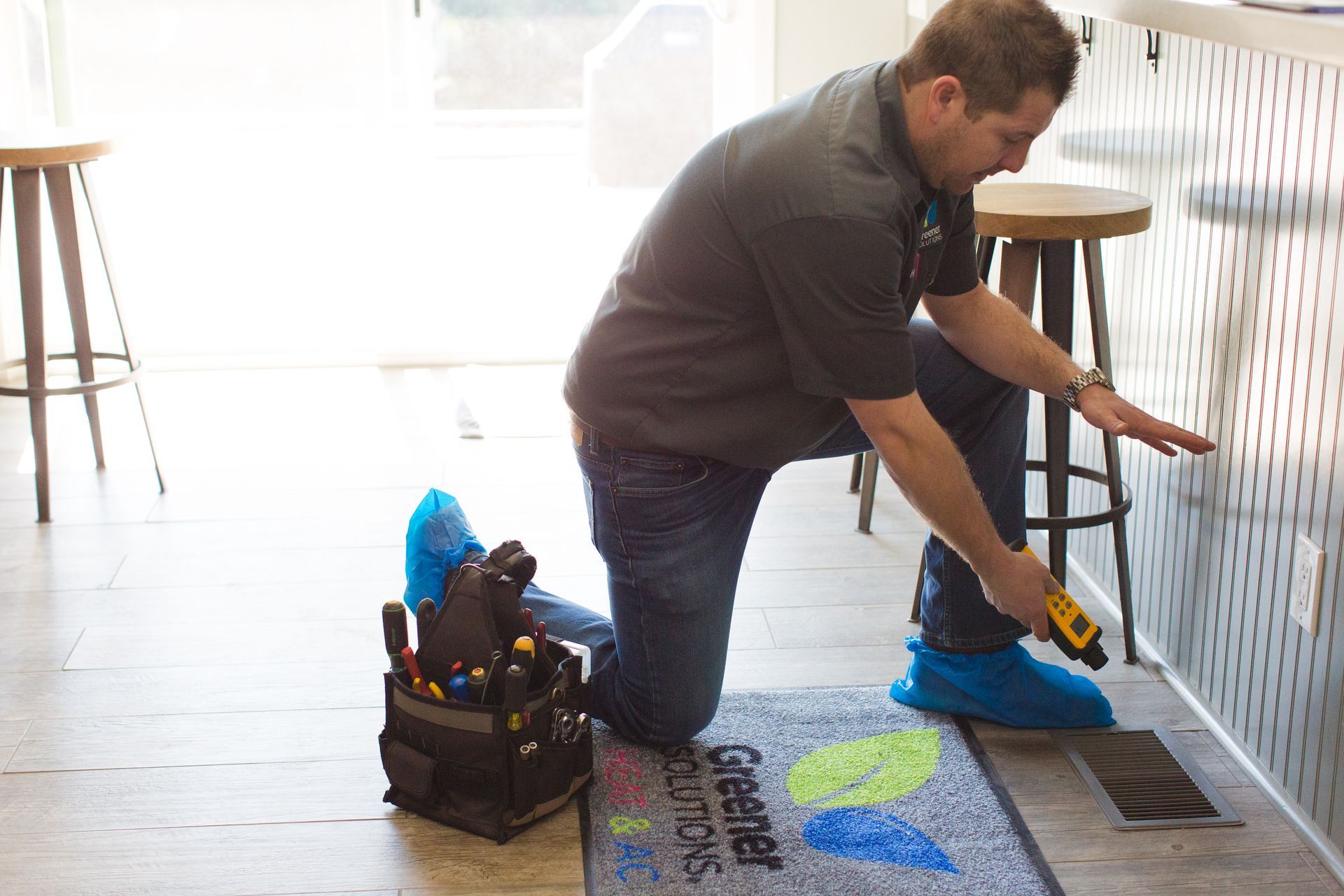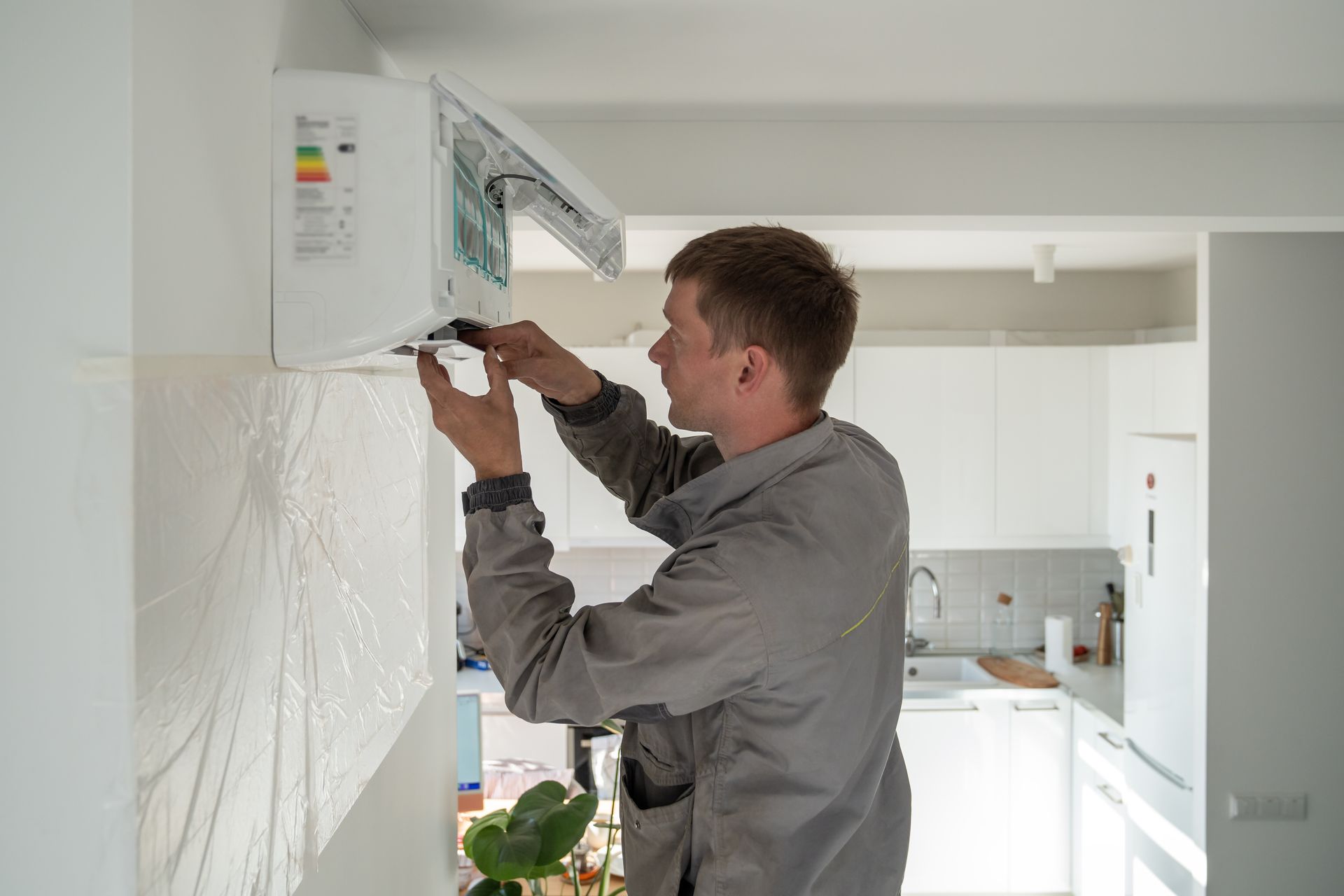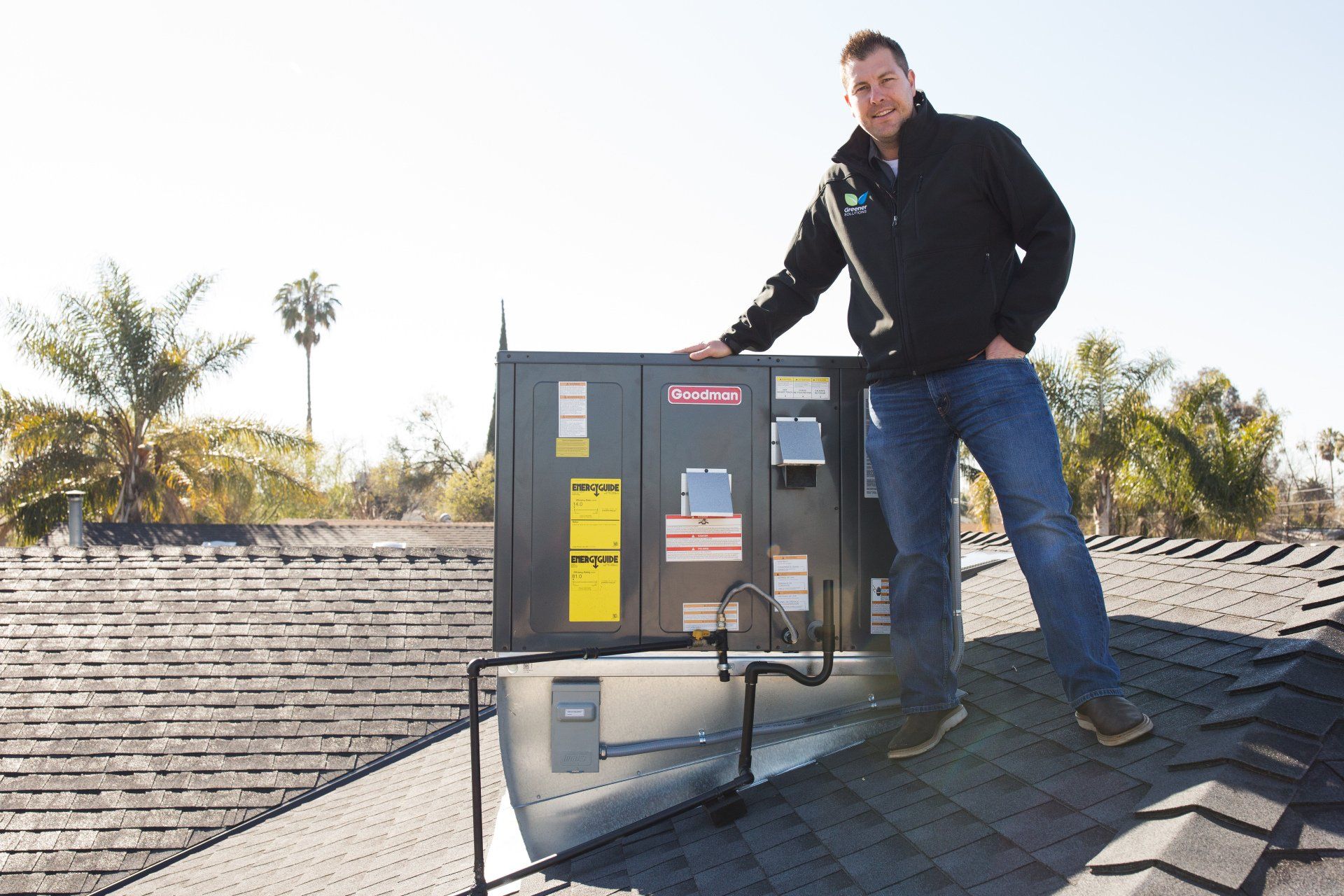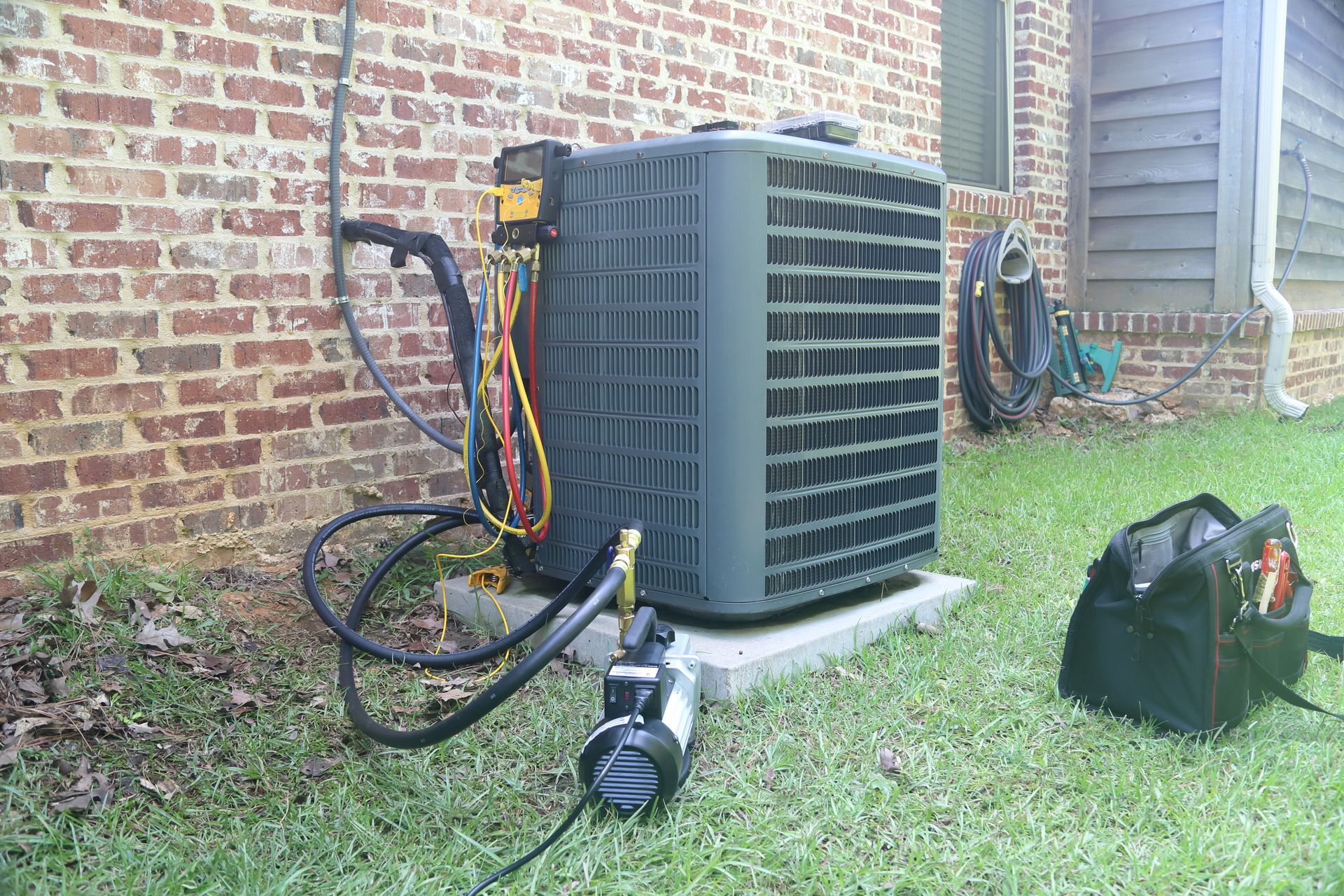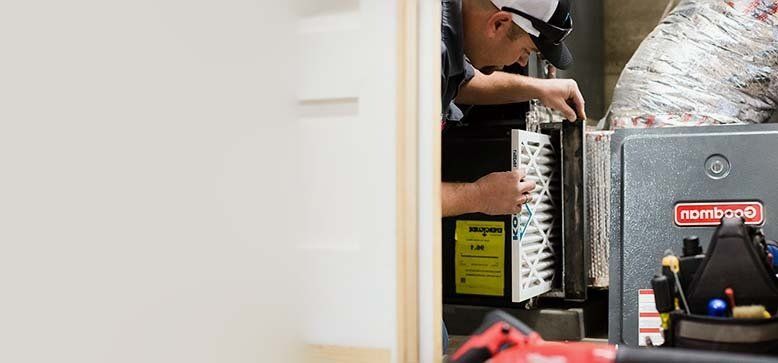Why is My AC Leaking Water?
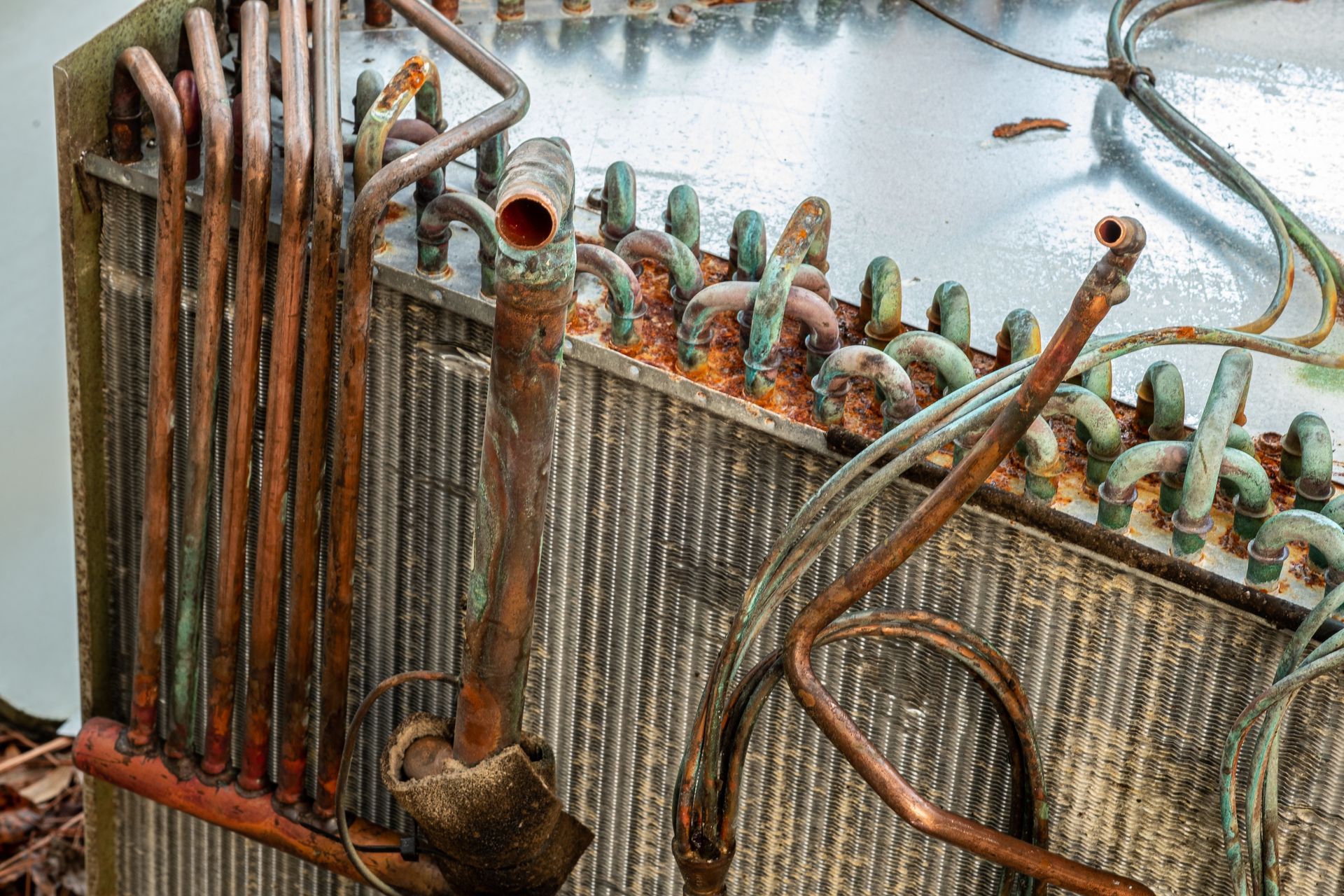
Your air conditioner becomes an essential appliance during the scorching summer months, especially in regions like Central California. However, if you find your AC leaking water, you’ll have to investigate the cause and figure out how to solve the problem to prevent further issues. As a homeowner, encountering a leaking air conditioner can quickly escalate from a minor inconvenience to a major problem, potentially damaging ceilings, walls, and floors, while also compromising the AC's performance and efficiency. Moreover, excessive moisture can lead to the growth of mold which can drastically reduce the air quality inside your home. At Greener Solutions Home Services, our experienced team has dealt with numerous instances of leaking air conditioners, which provides us with the expertise to address this issue effectively. We will explore the potential reasons behind an AC leak and provide you with some steps to identify and troubleshoot the issue. If the problem persists, professional maintenance will ensure your AC remains in optimal working condition while safeguarding your home from further damage.
How Do Air Conditioners Work?
It is important to understand how air conditioners work to understand where water may be leaking from. Air conditioners operate by extracting heat from inside and releasing that heat outside rather than just adding cool air like most people might think. This process requires that the evaporator coils, compressor, and condenser all work in unison to pump refrigerants through the system so heat exchange can occur.
The first step starts with warm air being drawn into a filtered return vent which then gets passed over chilled evaporator coils that contain cold liquid refrigerants. As the air moves over these coils, heat exchange occurs in the air and the refrigerants. The refrigerant inside the coils absorbs the heat which causes the liquid refrigerant to evaporate and expand and the air is cooled which then gets blown back into the living areas through the supply vents.
Next, the hot gas travels to the compressor located outside the house. The compressor's function is to compress the gas, further increasing its temperature and pressure before the hot gas reaches the condenser. Here, the heat is discharged outdoors, allowing the refrigerant to cool down and transform back into a cold liquid state so it can repeat the cycle.
By removing heat from the indoor air and releasing it outside, air conditioners effectively lower the temperature and create a comfortable living environment. Understanding this basic principle helps homeowners grasp the functionality of their air conditioning systems and ensures they can better maintain and troubleshoot any issues that may arise.
Why Does Water Form in My Air Conditioner?
Water forms in air conditioners due to the process of condensation. In modern AC systems, there is an indoor unit that houses the evaporator coil responsible for cooling the warm air blown over it to create a comfortable indoor temperature. As hot air passes over the evaporator coil, condensation occurs, similar to water droplets forming on a cold glass. The moisture that forms on the coil then drips into a drain pan and flows through a condensate drain line, which is designed to lead the water outside of the home.
Under normal circumstances, the condensate drain line effectively removes the water, preventing any leakage inside the house. However, there can be instances when the air conditioner starts to leak water indoors. This could be due to various reasons, such as clogged drain lines, damaged drain pans, or faulty installation. It is important to address these issues promptly to avoid further damage and ensure the efficient operation of the AC system.
Understanding the process of water formation in air conditioners helps homeowners identify potential problems and take appropriate action. If water leakage occurs, it is advisable to contact HVAC professionals to help diagnose and fix the issue.
Reasons Your Air Conditioner is Leaking Water
Continued usage of a leaking air conditioner is not advisable for prolonged periods. It is recommended to turn off the system and investigate the root cause of the issue, which often falls within the realm of 10 common reasons listed below.
Clogged Condensate Drain Line
A clogged condensate drain line is a common cause of water leakage from an air conditioner into your home. When the drain line becomes obstructed with dust, dirt, sludge, or mold, the water backs up and cannot be discharged. To fix this problem, the drain line needs to be unclogged using a wet/dry vac or pipe cleaners. Professional HVAC technicians also have a specialized vacuum that can remove the blockage.
To prevent blockage in the condensate drain line, regular HVAC maintenance should be done at least once a year, preferably before summer temps require air conditioners be on all the time. This will include cleaning the drain pan, inspecting the drain line, and using a long wire brush to remove any buildup. Pouring a diluted bleach mix down the drain line every six months can also help keep the line free of any mold or bacteria growth. By prioritizing HVAC maintenance, you can mitigate the risk of a clogged drain line and the subsequent water leakage from your air conditioner.
Drain Line is Disconnected or Damaged
When the drain line of your air conditioner becomes disconnected or damaged, it can lead to water leakage inside your home. Typically, the drain pan directs water into the drain line, but when the connection is severed or damaged, the water leaks out instead of being directed outside. If you notice your AC leaking water due to a problem with the drain line, it is advisable to seek professional assistance from an HVAC technician so the line can be reconnected or replaced.
A disconnected drain line can occur as a result of poor installation practices, improper repairs, or just become loose over time. This is a serious problem that can result in water damage as water saturates the area around the unit. To fix this issue, it’s best to contact HVAC professionals to reconnect the drain line.
Damaged Drain Pan
The drain pan, or drip pan, in an air conditioning system plays a crucial role in collecting condensation from the evaporator coils. However, drain pan can become damaged or rusted over time which leads to water leaking. This is more common in older air conditioners that are between 12 and 15 years old. If your drain pan is damaged, water won’t channel into the drain line.
The 3 most common drain pan materials include galvanized steel, stainless steel, or polymer.
- Galvanized steel pans are the most commonly used but are less durable, lasting around 20 years.
- Stainless steel pans are more resistant to corrosion and have a longer lifespan of about 25 years, albeit at a higher cost.
- Polymer drain pans are rust-resistant and have the longest life span. Their non-stick properties make it difficult for microbes to accumulate in cases of clogged drain pans.
If you encounter a damaged or rusted drain pan, contact an HVAC specialist who can either seal a cracked drain pan securely or replace a rusted one with a properly sized and compatible drain pan. By addressing the issue promptly, you can prevent further water leakage and potential water damage to your AC system and surrounding areas.
Broken Condensate Pump
In certain HVAC setups, such as when the furnace and indoor AC unit are located in the basement, condensate pumps are necessary because gravity alone cannot effectively drain the water from the drain pan. If the condensate pump breaks, the water won’t be pumped outside which will lead to excessive water buildup and potentially leaks. It is important to promptly repair or replace the broken condensate pump to prevent water damage to your home.
Condensate pumps are typically found in basements or in attics where the AC unit is situated far from the exterior. When the water level in the pump's tank reaches a certain point, a float switch is triggered, activating the pump to remove the condensate. If you suspect a broken condensate pump, it is recommended to seek the assistance of experienced HVAC professionals to diagnose the issue and replace the broken pump if needed.
Frozen Coils
When an air conditioner's evaporator coil freezes, it is typically caused by reduced airflow or a refrigerant leak. Reduced airflow results in not enough heat being absorbed by the refrigerant which prevents it from warming up and turning into a gas. When this occurs, the refrigerant ends up freezing inside the coils instead. Reduced airflow can be attributed to various issues such as a dirty filter, blocked return vent, damaged fan, collapsed air duct, or dirty coil.
The other culprit is a refrigerant leak which lowers the pressure inside the coils and results in the remaining liquid refrigerant inside the evaporator coils to expand. When this happens, the temperature of the coil drops, leading to freezing. Anytime the evaporator coils freeze over, the drain pan may become overwhelmed and cause water to leak out.
To address a frozen evaporator coil and restore proper airflow, it is important to first turn off the AC unit. The dripping water observed is a result of the unit thawing out. It is advisable to contact a professional HVAC technician to inspect the unit and ensure it runs smoothly after the thawing process.
If your air conditioner is freezing up, it is crucial to identify and resolve the underlying problem. Check for any airflow blockages, including dirty air filters, blocked return vents, or dirty fin coils, and clean them to restore proper airflow and potentially resolve the freezing issue. If cleaning the filters does not solve the problem, it may indicate a refrigerant shortage which requires the help of an HVAC technician.
Dirty Air Filter
Dirty air filters will often lead to leaking air conditioners because the reduction in airflow over the evaporator coil causes the coil to become excessively cold and freeze over. Once the ice on the coil starts to melt, it can produce an amount of water that is too much for the drain pan to handle. If the water levels exceed what the drain pan can contain, water will spill over the edges and leak.
To prevent this from occurring, regularly check and change or clean the air filter. Typically, most air conditioner filters need to be cleaned or replaced every 1-3 months depending on the season. A dirty air filter obstructs proper airflow and puts unnecessary strain on the HVAC system. This can potentially result in damage to other components that get overworked and break from excessive wear and tear. By changing air filters regularly, homeowners can improve airflow which stops freezing and prevents leakage.
Cleaning the air filter requires that it be removed from the unit, rinsed, and allowed to dry completely before reinstalling it. When the AC is used more frequently like during hot summer months, it should be cleaned every month and replaced every 3 months.
Low Refrigerant
When refrigerant levels get low, it can lead to water leaking and other problems like the air conditioner being overworked. What happens when the refrigerant inside the air conditioner is low, is the pressure in the AC system drops which causes the evaporator coils to freeze. As the coil eventually thaws, the excess water overflows the drain pan, resulting in leakage.
Signs of low refrigerant include inadequate cooling performance from the air conditioner and the presence of a hissing or bubbling noise. If low refrigerant is detected, it is crucial to address the issue promptly. Depending on the severity of the refrigerant leak, repairs may involve fixing the leak itself or replacing the entire AC unit. Regular inspections of your HVAC system are critical to prevent and detect issues like low refrigerant levels and it’s recommended that homeowners schedule a thorough inspection before each summer to identify and address potential leaks.
Excessive Condensation
Condensation buildup inside of air conditioners can lead to water leakage and serious damage to your home in addition to compromising indoor air quality. One common reason for excess condensation is the lack of adequate insulation around ducting, which allows warm air to come into contact with cold ducts, resulting in condensation. Similarly, condensation can occur if the ductwork passes through an inadequately insulated attic or basement.
High levels of humidity from roof leaks and poor ventilation can contribute to increased humidity and exacerbate condensation buildup. Maintaining humidity levels between 30-50% in your home is ideal with anything higher resulting in excess condensation. To fix condensation buildup and prevent leakage, insulate ductwork properly to ensure that warm air cannot reach the cold ducts. It also helps to insulate the attic space properly to help reduce the temperatures surrounding the ductwork and fix any leaks in the roof.
Air Leak Around Vents
Air vent leaks are another common cause of water leakage in air conditioners. When there is space around the air vent, air can escape and create condensation that drips from the vent. Homeowners can check for this problem by placing their hand under the vent and feeling for any air blowing from the sides of the vent grate. If air is escaping, it is likely contributing to the excess moisture leaking out. Fortunately, this is a relatively easy fix that requires caulking to create a tight seal around the vent and preventing air from escaping.
Improper AC Installation
Improper AC installation can be a significant cause of water leakage in an air conditioner. Faulty installation can lead to various issues, including water leakage that cannot be resolved through DIY methods. Improper drainage due to installation errors can result in accumulated water underneath the unit, potentially causing damage to ceilings and other structures.
One common installation mistake is having an AC unit that is either too big or too small for the home, which can disrupt proper airflow and circulation within the structure. This can lead to inefficiencies and potential water leakage that need to be resolved by HVAC professionals.
Installing an air conditioner correctly from the start will help prevent water leakage caused by improper AC installation. This includes proper leveling of the air conditioner and correctly connecting all of the drain lines to maintain smooth water outflow. For central air conditioners, it is essential to place both indoor and outdoor components on a flat surface to ensure proper balance. In the case of window AC units, they should be tilted slightly upwards from the front to facilitate water drainage outside rather than inside the house.
What are the Dangers of Water Leaking from Your AC?
Water leaking from your air conditioning (AC) system can pose several dangers that need to be addressed promptly. One concern is the potential growth of mold and mildew. When the AC unit produces excessive condensation due to continuous operation or a clogged drain, the overflow can seep into insulation. The combination of moisture and warm air creates an ideal environment for mold and mildew to thrive. If left unattended, a significant mold problem can develop, impacting indoor air quality and potentially causing health issues.
Another danger of water leakage is the damage it can cause to sheet rock and insulation. Sheetrock is vulnerable to water damage, and even a small amount of leakage can lead to significant destruction within a short period. The soaked sheetrock may become weak, sag, or develop mold, requiring extensive repairs or replacement.
Water dripping onto electrical components is also a significant concern. The presence of water can lead to electrical complications and potentially cause a short circuit, damaging the AC system or even posing a fire hazard. If you suspect that water has compromised the electrical system, it is essential to seek the assistance of a qualified electrician before attempting any AC repairs to ensure safety and prevent further damage.
When water leakage occurs from your AC unit, it is crucial to address the issue promptly to mitigate the dangers associated with it. Addressing the root cause of the leakage will help prevent mold and mildew growth, protect your property from water damage, and maximize the longevity and efficiency of your AC system.
What Should You Do if Your AC Is Leaking Water?
If your air conditioner is leaking water, follow these steps to ensure that the leaking is stopped, cleaned, and repaired.
- Turn off the air conditioner when excess water is found around the air conditioner. This will prevent further water damage while the leak is located.
- Clean up leaking water using a wet/dry vac or a mop and use fans to dry out the affected area to prevent the growth of mold and mildew.
- Inspect the lines on the outdoor unit and the evaporator coils in the air handler for ice buildup.
- Melt the ice by running the fan, and not the air conditioner, to pull warm air in over the frozen coils.
- Inspect and clean or replace the air filter as needed. This should be done regularly to maximize airflow.
- Check to see if the condensate line is clogged and if the drain pan is damaged. Standing water in the drain pan will typically indicate a clogged line and rust or other visible damage may indicate that the drain pan is leaking.
- Contact an HVAC professional to assist with diagnosis and repairs.
It is important to note that using the AC system while it is frozen will not effectively cool your home and may cause further damage. Finding ice is generally indicative of a larger problem like needing a refrigerant recharge or other repairs that may require a professional to fix.
Important to Remember to Rule Out Roofing and Plumbing Leaks
When you notice water dripping from your AC vents, it's important to consider the possibility of plumbing or roof leaks before assuming it's an issue with your AC system. Sometimes, a leak unrelated to your air conditioner, such as a roof or plumbing leak, can allow water to travel into your ductwork and eventually cause water to drip from the AC vents.
To address this, you should follow the path of the leak to identify its source, if possible. If the leak is coming from the roof, contacting a professional roofing expert is recommended to inspect and repair any issues. In the case of a plumbing leak, a plumber should be contacted to assess and fix the problem. By ruling out these potential sources of the leak, you can ensure that the correct experts are called upon to resolve the issue effectively.
Can You Still Use Your AC When It is Leaking Water?
If your air conditioning unit is leaking water, you shouldn’t continue to use it because it will be less efficient and cost more money to run while also potentially causing damage to the unit and your home. To prevent further damage, any problems should be repaired by a professional HVAC technician. Using a leaking AC can result in other internal components working harder than they need to, which can shorten the lifespan of your unit and costly repairs or even the need for a replacement. Contact a professional HVAC technician to diagnose and repair the issue, addressing both the leak and any potential damage it may have caused.
How to Stop AC Leaks in the Future?
To prevent AC leaks in the future, schedule annual or biannual maintenance for your AC system. Maintenance is best done in the spring before the summer season starts. An HVAC professional should conduct a thorough inspection, checking for cracks or rust in the drain pan and treating it to prevent algae growth. During an AC tune-up, an HVAC technician should flush the drain line and ensure the condensate pump works in addition to other important checks. Regular maintenance can help identify and address potential issues before they escalate into major problems. It is also important to avoid AC use when outdoor temperatures are below 60 degrees Fahrenheit. Using the AC when it is unnecessary due to it already being cold can cause the system to freeze.
Contact a professional HVAC technician if the listed suggestions do not resolve a leaking air conditioner. They can provide a comprehensive system tune-up and address any underlying issues that may be contributing to the leaks. Additionally, they may need to top off the refrigerant levels in your system to ensure optimal performance. Seeking professional assistance is crucial for resolving persistent AC leaks and ensuring the long-term functionality of your cooling system.
Contact Greener Solutions Home Services if You Need AC Repair
Water dripping from your air conditioner is a sign of potential issues that should not be ignored. Whether it's due to clogged drains, frozen coils, or other underlying problems, it's crucial to take prompt action to prevent further damage and ensure the efficient operation of your AC system. If you're experiencing water leakage or need professional assistance with your air conditioner, don't hesitate to contact Greener Solutions Home Services. Our team of experts is ready to provide reliable and efficient solutions for all your air conditioner-related needs. Give us a call today to schedule a service and enjoy a cool and comfortable indoor environment.
AC Leaking Water FAQs
-
How do I stop my air conditioner from leaking water?
To stop your air conditioner from leaking water, make sure to regularly clean or replace the air filters, check for any blockages in the drain line, ensure proper insulation around the unit, and schedule regular professional maintenance.
-
Why is my AC dripping water?
Your AC may be dripping water due to reasons such as a clogged drain line, frozen evaporator coil, improper installation, low refrigerant levels, or a malfunctioning condensate pump. It is best to have a professional HVAC technician diagnose and resolve the issue.
-
Is it OK if my AC is dripping water?
No, it is not okay if your AC is dripping water. Water leakage from an air conditioner can indicate underlying problems that need attention. Ignoring it may lead to further damage to your unit, potential mold growth, and reduced cooling efficiency. It is recommended to address the issue promptly by contacting a professional HVAC service provider.
Recent Posts
-
Our Services
ButtonSee All Our Services
-
About
ButtonLearn More about
Greener Solutions
-
Contact Us
ButtonImmediate Service
Emergency Services
Live Support
Have an HVAC emergency? Call for immediate service. Available 24/7

